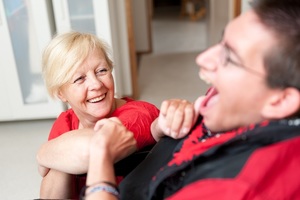All inpatients with learning disability or autism to be given case reviews
Every inpatient with a learning disability or autism in a mental health hospital will have their case reviewed over the next 12 months.

All 2,250 patients with learning disabilities and autism who are inpatients in a mental health hospital will have their care reviewed over the next 12 months, the Health and Social Care Secretary Matt Hancock has announced today.
As part of the review, the government will commit to providing each patient with a date for discharge, or where this is not appropriate, a clear explanation of why and a plan to move them closer towards being ready for discharge into the community.
This announcement builds on recent statistics which show that there has already been a 22% reduction of inpatient numbers since March 2015. The government is also committing today to a further reduction of up to 400 inpatients to be discharged by the end of March 2020.
For those in long-term segregation, an independent panel, chaired by Baroness Sheila Hollins, will be established to oversee their case reviews to further improve their care and support them to be discharged back to the community as quickly as possible.
The panel will include independent experts who will monitor, challenge and advise on the progress of case reviews of those in the most restrictive settings, with the aim of supporting more people to be discharged. The panel will expect a clear plan towards a discharge date or an explanation for how providers are making progress towards discharging the individual.
This is a direct response to the recommendation of the Care Quality Commission’s review of restrictive practices. In addition, the government will ensure that all inpatients have a case review focused on how to discharge them into the community.
A further measure will see the government commit to greater transparency in this area, by agreeing to publish data on inpatients in mental health settings who have a learning disability or are autistic. This will take the form of an information dashboard, which will include data on inpatient rates in different regions, so areas can learn and share good practice.
The government is also confirming today that every NHS and social care worker will receive mandatory training relevant to their role.
The new training is backed by £1.4 million of government funding and will focus on:
- understanding learning disability and autism
- legislation and rights
- making reasonable adjustments such as using different communication methods for autistic people with sensory sensitivities
As part of this, the government will run a series of trials next year to inform a wider roll-out of the training, which aims to improve quality of care and life expectancy.
Work is already underway to deliver the training and testing will take place in a variety of health and social care settings to help shape how it will be rolled out and delivered in future.
The specially designed training will be named in memory of Oliver McGowan, in recognition of his family’s tireless campaigning for better training for staff. It will draw on case studies to demonstrate why it is so important.
Today’s announcement follows a consultation process that listened to the views of over 5,000 people, including charities, patient groups, professional bodies and the public. The responses overwhelmingly backed the principle of mandatory training.
Health and Social Care Secretary Matt Hancock said:
For those living with learning disabilities and autistic people, the current system can leave them in isolation for long periods of time, with no prospect of release into the community.
I am determined to put this right and today we are committing to reviewing the care of every patient with learning disability and autism over the next 12 months – alongside a clear plan to get them discharged back into their homes and communities. I have also asked for advice on separating out the law regarding those with learning disabilities and autism from the law regarding mental health.
This will start with those in the most restrictive settings. I am delighted Baroness Hollins has agreed to chair our new independent panel to make sure that they are supported to discharge as quickly as possible. Baroness Hollins brings a wealth of experience and will provide the right level of scrutiny and challenge to ensure that everything possible is done to improve care on the ground.
Baroness Sheila Hollins said:
I don’t think it can ever be right to segregate someone as a form of care, and even more so when there is no planned end date.
The oversight panel will actively review progress of an action learning project designed to identify existing barriers, and implement solutions that will transform people’s lives. Our focus will be on each person’s humanity, and entitlement to live an ordinary and safe life in a place where their own concerns and needs will be understood and met by supporters who treat them with respect and have the right skills and supervision.
Minister for Care Caroline Dinenage said:
It is unacceptable that the lives of autistic people or those with a learning disability could be cut short because of barriers in accessing healthcare that most of us take for granted.
I want to ensure this training provides NHS staff and social care workers with the confidence and skills to understand the needs of those with learning disabilities and autistic people.
Paula McGowan has been instrumental in campaigning on this issue, giving a voice to many people who aren’t always able to speak up for themselves. I hope this training and the wider measures announced today will go far in ensuring all autistic people and those with a learning disability are listened to and receive the high-quality care they deserve.